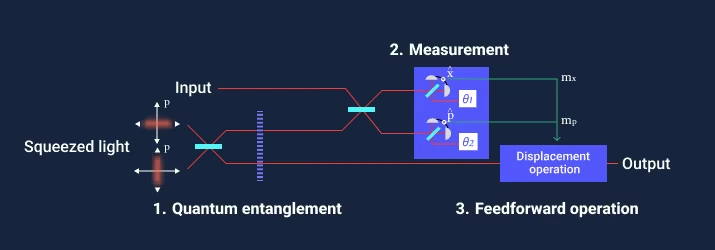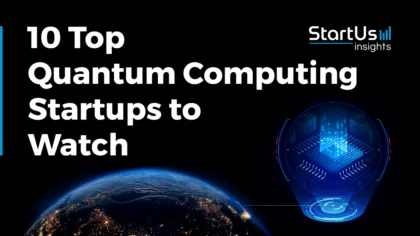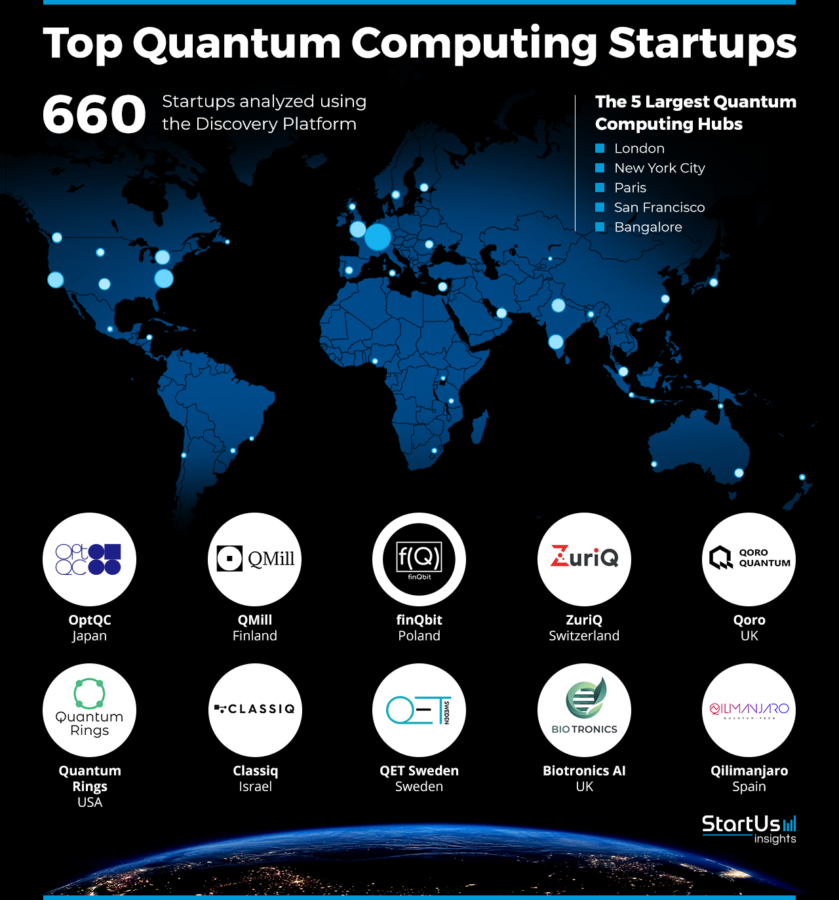Accelerate Productivity in 2025
Reignite Growth Despite the Global Slowdown
Executive Summary: Which are the Top 10 Quantum Computing Companies and Startups to Watch?
The global quantum computing market is projected to reach USD 1.44 billion by 2025 and is expected to grow to USD 16.44 billion by 2034, expanding at a compound annual growth rate (CAGR) of 30.88%. This report highlights 10 quantum computing startups to watch in 2025:
- OptQC (Japan) – builds photonic quantum computers using time-domain multiplexing and teleportation for scalable, energy-efficient processing.
- QMill (Finland) – develops NISQ-ready quantum algorithms that solve complex optimization problems across multiple industries.
- finQbit (Poland) – offers quantum risk management software to accelerate financial modeling and simplify quantum adoption.
- ZuriQ (Switzerland) – creates a 3D trapped-ion quantum architecture that enables scalable, reconfigurable qubit movement.
- Qoro (UK) – provides a hardware-agnostic orchestration stack for hybrid quantum-classical computing across cloud and on-prem systems.
- Quantum Rings (Israel) – delivers a low-code platform for automated design and optimization of advanced quantum circuits.
- Classiq (US) – offers a simulation SDK to run quantum applications on classical hardware without added cost or delay.
- QET Sweden (Sweden) – builds superconducting three wave mixing (TWPA) to boost signal performance in quantum processors and measurement setups.
- Biotronics AI (UK) – applies quantum machine learning to enhance diagnostics, drug discovery, and genomics in life sciences.
- Qilimanjaro (Spain) – develops an analog quantum annealing platform with full-stack integration for solving real-world optimization problems.
Global Startup Heat Map highlights Emerging Quantum Computing Companies to Watch
Through the Big Data & Artificial Intelligence (AI)-powered StartUs Insights Discovery Platform, covering over 7M+ startups, 20K+ technology trends, plus 150M+ patents, news articles & market reports, we identified 10 quantum computing startups.
The Global Startup Heat Map below highlights emerging quantum computing startups you should watch in 2025, as well as the geo-distribution of 660 startups & scaleups we analyzed for this research.
According to our data, we observe high startup activity in the USA and France, followed by India. The top 5 Startup Hubs for quantum computing are London, New York City, Paris, San Francisco, and Bangalore.
Meet Emerging Quantum Computing Companies to Watch in 2025
We hand-picked startups to showcase in this report by filtering for their technology, founding year, location, funding, and other metrics. These emerging quantum computing startups work on solutions ranging from photonic quantum computers and trapped-ion qubits to quantum circuit design and quantum annealing platforms.
1. OptQC
- Founding Year: 2024
- Location: Tokyo, Japan
- Use For: Photonic Quantum Computer
- Funding: Raised JPY 650 million in seed round funding
OptQC commercializes photonic quantum computers that leverage optical quantum computing technologies developed by the Furusawa-Endo Laboratory.
The startup’s quantum teleportation technology reconstructs the same quantum state at a distance without directly seeing this quantum information. The technology enables the development of a large-scale, high-speed optical quantum computer that handles both digital and analog information.

Credit: OptQC
Moreover, OptQC achieves large-scale quantum computing using a multiplexing technique called time-domain multiplexing. This allows the startup’s quantum computer to achieve both energy efficiency and information processing capabilities. These quantum computers also integrate with the optical communication field, enabling sustainable social infrastructure.
2. QMill
- Founding Year: 2024
- Location: Espoo, Finland
- Use For: Noisy Intermediate-scale Quantum
- Funding: Raises EUR 4 million in seed funding to deliver near-term industrial quantum advantage
QMill develops quantum algorithms for the noisy intermediate-scale quantum (NISQ) computer. The startup’s quantum-advantage algorithms execute on near-term quantum computers, solving complex problems that are too large for existing supercomputers.
Moreover, the quantum algorithms address complex optimization problems across diverse industries like finance, telecommunications, real estate, energy, and supply chain analytics. QMill’s proof-of-concept algorithms are further capable of running on simulators or real, existing NISQ computers.
3. finQbit
- Founding Year: 2023
- Location: Lublin, Poland
- Use For: Quantum Risk Management Software
finQbit develops a quantum risk management software platform that enables financial institutions to accelerate complex risk calculations.
The startup’s platform expedites longstanding calculations by using quadratic acceleration in its algorithms. It allows businesses to save time navigating through quantum specifics. This also enables organizations to implement quantum computing frameworks by migrating existing modes and calculations to the platform and delivering tangible value.
Additionally, finQbit covers the complexity of quantum computers and improves the deployment of algorithms that cater to specific business needs. The platform also enables the utilization of existing computing power and transitions the models to be quantum-ready.
4. ZuriQ
- Founding Year: 2024
- Location: Zurich, Switzerland
- Use For: Trapped-ion Qubits
- Funding: Raised EUR 4 million
ZuriQ develops a trapped-ion quantum computing architecture that enables qubits to move freely in all spatial directions. This startup uses a combination of static electric and magnetic fields to overcome the scaling limitations of traditional one-dimensional ion chains.
Additionally, the platform changes the way ions are trapped and builds an architecture that is natively three-dimensional without sacrificing connectivity or compromising on fidelity. It also enables rapid qubit scaling, full reconfigurability, parallel gate operations, and compatibility with industrial silicon chip fabrication processes.
ZuriQ’s platform further solves challenges in the pharmaceutical, chemistry, or logistics sectors where the demand for hardware performance is rapidly increasing.
5. Qoro
- Founding Year: 2024
- Location: London, UK
- Use For: Hardware-agnostic Software and Orchestration Stack
Qoro develops a hardware-agnostic software and orchestration stack that powers distributed quantum computing by integrating quantum and classical systems. This includes across diverse hardware environments like graphics processing unit (GPU) clusters, high-performance computers, and quantum processors.
The software and orchestration stack automate the entire workflow from user application to execution. It also optimizes resource allocation and synchronizes workloads for both the algorithm and the available hardware.
Moreover, the software and orchestration stack removes hardware-specific complexities for end users and provides a network stack for hardware providers.
Further, Qoro features automatic parallelization and partitioning of quantum algorithms, cloud integration, and real-time orchestration of hybrid quantum-classical workflows.
The platform also enables efficient resource utilization, reduced code overhead, and the ability to scale quantum applications beyond single-processor limitations. It is supported by middleware that enables automated workload generation and dynamic circuit execution.
Want to Explore 660 Quantum Computing Startups & Scaleups?
6. Classiq
- Founding Year: 2020
- Location: Tel Aviv, Israel
- Use For: Quantum Circuit Design
Classiq delivers a quantum computing software platform that integrates an integrated development environment (IDE), software development kit (SDK), compiler, and operating system. These technologies automate the design, optimization, and execution of advanced quantum circuits.
Moreover, the startup’s technology improves high-level functional models into optimized quantum circuits. This allows businesses to quickly develop, analyze, and deploy algorithms across a range of quantum hardware and cloud providers.
Its platform further features automated circuit synthesis, hardware-aware optimization, and a high-level modeling language. They streamline the development process for both experts and beginners while supporting seamless benchmarking and execution on simulators or real quantum machines.
In addition, Classiq specifies system-level constraints, reuses modular functional blocks, and protects proprietary quantum intellectual property, all within a low-code environment. This democratizes access to quantum computing for businesses with backgrounds in AI, ML, and linear algebra.
7. Quantum Rings
- Founding Year: 2023
- Location: Boulder, CO, US
- Use For: Quantum Simulation SDK
Quantum Rings delivers a universal quantum simulation SDK that enables developers, enterprises, and researchers to build, test, and execute high-fidelity quantum applications at scale using standard computing hardware.
It operates by simulating hundreds of qubits and millions of gate operations with high accuracy. The startup’s proprietary algorithms replicate complex quantum circuits.
Additionally, the startup’s SDK integrates natively with Qiskit and major operating systems and supports compatibility with popular quantum packages such as Qiskit-Finance and Qiskit-Nature.
These solutions offer zero wait times or incremental costs for simulation, making them accessible for both academic and enterprise users. Quantum Rings’ solution further allows the quantum development community to improve the implementation of optimization, cryptography, machine learning, and materials science.
8. QET Sweden
- Founding Year: 2024
- Location: Gothenburg, Sweden
- Use For: Three Wave Mixing (TWPA)
QET Sweden develops superconducting microwave components, including three-wave mixing traveling-wave parametric amplifiers (TWPA). These amplifiers enhance signal processing in quantum and microwave technologies.
The startup’s TWPA also increases the performance of superconducting and spin-based quantum processors while facilitating the development of practical quantum computing. The patented dispersion engineering and three-wave mixing enable 4 GHz of uninterrupted gain with added noise below 1 photon.
Further, QET Sweden offers two models for flexible deployment, Model D and Model S. Model D, with two TWPAs combined in the same enclosure, enables multi-channel measurements that benefit from dual amplification in a single box.
The single TWPA Model S is suitable for setups needing a high-performance amplifier with a minimal footprint. These solutions support research and development in areas such as medicine, environmental stewardship, and energy.
9. Biotronics AI
- Founding Year: 2024
- Location: Hertfordshire, UK
- Use For: Quantum Machine Learning
Biotronics AI integrates quantum machine learning and artificial intelligence (AI) into medical technologies. They advance diagnostic accuracy and treatment processes across molecular biology and life sciences.
The solutions combine quantum computing algorithms with classical AI to analyze complex biological data, simulate molecular interactions, and model quantum states at the atomic level. This improves the precision of drug discovery, genomic analysis, and clinical diagnostics.
Also, the startup’s products, such as Forensight and Medisight, utilize quantum-enhanced models to improve high-throughput screening and optimize radiotherapy treatment plans. This enables early detection of diseases through pattern recognition in medical images and genomic data.
Biotronics AI further processes large, multidimensional datasets with greater speed and accuracy while supporting personalized medicine through predictive analytics.
10. Qilimanjaro
- Founding Year: 2019
- Location: Barcelona, Spain
- Use For: Quantum Annealing Platform
Qilimanjaro develops an analog quantum annealing platform that delivers application-specific quantum computing solutions for complex industrial challenges in different sectors. This involves logistics, finance, energy, chemistry, and materials science.

Credit: Qilimanjaro
The startup’s platform utilizes superconducting circuits to create quantum app-specific integrated circuits (QASICs). They operate through a continuous, analog computational process that efficiently encodes and solves optimization and simulation problems.
Moreover, the platform integrates hardware, software, and algorithms and also provides cloud access for businesses to run quantum algorithms and simulations. It further offers on-premise deployment and integration services for high-performance computing centers and enterprise clients.
The startup’s co-design approach aligns quantum chip architecture with specific use cases, high-quality qubit-qubit interactions, and a full-stack programming framework. It improves time to quantum advantage and reduces development complexity.
Discover All Emerging Industry 4.0 Startups
The Industry 4.0 startups showcased in this report are only a small sample of all startups we identified through our data-driven startup scouting approach. Download our free Industry 4.0 Innovation Report for a broad overview of the industry or get in touch for quick & exhaustive research on the latest technologies & emerging solutions that will impact your company in 2025!





![Discover the Top 10 Industrial Machinery Trends & Innovations [2026]](https://www.startus-insights.com/wp-content/uploads/2025/08/Industrial-Machinery-Trends-SharedImg-StartUs-Insights-noresize-420x236.webp)




